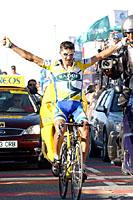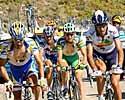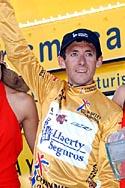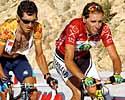





|
Hasiera · Home |
|
Ezaugarriak · Features |
|
Oharrak · Notes |
|
Sarrera · Introduction |
|
Euskara |
|
Folklore |
|
Kirolak · Sports |
|
Musika · Music |
|
Janedanak · Gastronomy |
|
Tokiak · Places |
|
Historia · History |
|
Politika · Politics |
|
Diaspora |
|
Internet |
|
Albisteak · News |
|
Nahas Mahas · Misc |

For security reasons, user contributed notes have been disabled.
by Martin Hardie
| Martin Hardie (Maputo/Durango) is a bit of a nomad. He has managed bands, worked in Aboriginal Art centres, been a solicitor, a barrister, an advisor to various members of the former East Timorese resistance, and a university lecturer. He currently spends his time as a moderator of the nettime list, undertaking his post-graduate research work and fulfilling his duties as a correspondent for www.cyclingnews.com. His ambition is to become the archetype of life within communism at the break of dawn a cyclist, during the day a cook, cyber-conspiracist and correspondent, in the afternoons a student and philosopher and, at nights, simply pleasant company. See his homepage at http://auskadi.tk/. |
 |
| Felix Cardenas (Cafes Baque) Photo ©: Unipublic |
The Plan Colombia of Durango based team Cafes Baque came good today on the road to the ascent of the ski station of Covatilla, high above the home town of Roberto Heras. Today the persistence of the peloton's more modest outfits paid off when its experienced Colombian climber Felix Cardenas crested the mountain first to take the stage. It is the third stage Cardenas has won in La Vuelta, with previous victories last year on Sierra Nevada and in 2000 at La Molina. He also has to his credit a Tour stage win in 2001 at Aix Les Thermes.
Cyclingnews spoke to Felix Cardenas after the stage and he told us that, "I am very happy because it has been especially difficult. I wasn't in the right condition prior to La Vuelta because 15 days before I fractured an arm and had to have it operated on. The doctors put in four screws, but I have recovered and with hope and will, things have turned out well. The victory is important also because we want this team, this project, to continue and it is also very important for my country and for my family.
"I attacked with seven kilometres to go where the ramps of 10 percent become very tough. The aim was to win a stage, but we will now defend this [mountains] jersey as well".
The victory of Cardenas was timely. Whilst other teams with budgets immeasurably much grander than Baque's fight it out to gain entry to the new UCI super league, the Colombian-Basque connection is fighting for its very survival. A few years ago, many a Spanish pro director continually scouted the Baque amateur line up in order to secure some of the best and brightest youngsters on their way up. Presently Iban Mayo is probably the most notable rider that has passed through Baque's ranks and into the pro peloton. But the pro teams could never take all of Baque's jewels, there have been just too many promising kids coming through. So as ex-Euskaltel rider Erkaitz Elkoroiribe looked towards life after racing, he commenced the process of transforming the team from not only an amateur squad but to having its own pro outfit as well.
 |
| Cardenas and Arrieta Photo ©: Unipublic |
Erkaitz explained to Cyclingnews that, "We got into the idea of having a professional team as an opening for the talented amateur riders in our part of the Basque Country, as many have serious problems in finding opportunities in the highest category. The initial idea was for Baque to back the team for two years and after that time hope to have consolidated the position. We were thinking that if the team went well, other co-sponsors would join Baque. Unfortunately we haven't got a co-sponsor big enough to help us, and without one the team probably won't be able to continue.
"Cafes Baque is a small family company based in Durango in the Basque company, amongst other things they import coffee from Colombia. They don't have the economic muscle to back a pro team forever without the collaboration of other sponsors and although the team has a number of smaller co-sponsors they are not sufficient for the team to continue without more".
Last year, the team made up of young inexperienced local riders started, like its sponsor, importing from Colombia. It is in many ways a likely union. Both countries have a strong following for cycling, and cycling has throughout the modern history of both played its role in galvanising their peoples. The Basques and the Colombians also have in common an attacking style full of flair. The union paid off in last year's Vuelta with Felix Cardenas taking the stage to Sierra Nevada and the mountains jersey in Madrid. With a reinforced lineup for this year's race Erkaitz hoped that a victory here or there and a strong showing by the team might help attract some more financial backers.
 |
| Roberto Heras (Liberty Seguros) Photo ©: Unipublic |
With all of this weight on their collective shoulders the Baque boys haven't been laying low. La Vuelta has seen many a breakaway this year and for a change a few have succeeded. The Baque boys have made every break so far in the race bar two, and amongst them Felix Cardenas has been prominent in going out on the road in search of mountain points - a little a la Virenque. Since the first day in the mountains, on the road to Aitana, Felix has been in the hunt. Mancebo has got in his way, Fernandez and Ferrio from Paternina have made things messy at times, Heras has picked up a few points of course and Santi Perez just won't stop finishing in the front on those mountain stages. So today Felix had to start again. He was at the start of the day 29 points behind the official mountain jersey leader, Roberto Heras.
How it unfolded
 |
| Felix Cardenas (Cafes Baque) Photo ©: Unipublic |
In the first kilometre of today's stage, Felix Cardenas got himself into a break that formed quickly and rolled away even quicker. The group comprised a few other good escapees: Constantino Zaballa (Saunier Duval), Volodimir Gustov (Fassa Bortolo), Tadej Valjavec (Phonak), José Luis Arrieta (Illes Balears) and Alberto Lopez De Munain (Euskaltel). It was surprising because the peloton was moving pretty fast at the time and at later stages set a fairly hectic rhythm. The gap grew and got up to about 8'30 at its peak. It was more than enough for Cardenas to take the points on the first two Cat. 1's, Piornal and the Honduras along with the Cat. 3 Cerro. These 32 points had him in the lead. The problem was that Liberty Seguros, who led the peloton behind, set a mighty rhythm up the narrow bare face of the Honduras. The road was barely a Humvee wide and the blue train of Saiz and Co. commenced to really turn the screws on Valverde, who suffered in the absolute tail of the peloton.
For a while, the Liberty onslaught made it look impossible for the Cardenas group to survive, but by the top of the Honduras, Valverde had reinserted himself in a more respectable position fixed to the rear wheel of Heras. Over the next climb, the Cat. 3 Cerro, Cardenas upped the pace. It wasn't the easiest Cat. 3 around as Caruso led the Liberty machine climbing in the little ring. This time though Saiz gave the order to conserve forces and instead of spending more than one of his riders, allowed the young Italian to keep the rhythm high but not blistering. The change of pace by Liberty gave the escapees some more room to move and another chance of survival. Cardenas achieved his third object of the day. The points were not huge, only 6 for crossing a Cat.3 first, but every little bit helped.
 |
| Jan Hruska Photo ©: Unipublic |
Down into Bejar the country really changed. Gone were the outback plains of Extremadura, the hills and valleys appeared here a little greener. Not verdant green but with enough green mixed up with the yellow and brown to make it feel like you are no longer passing through an eternal drought. The climb to Covatilla started immediately on the edges of Bejar. Just before it, at the meta volante, the Cardenas group had managed to roll their gap out again to close to five minutes. With 18 kilometres of climbing staring them in the face, it was still not a good bet that they might arrive in front. Certainly if they did, it would not be together.
Cardenas attacked where La Covatilla really started to kick in after 11 kilometres of climbing and with seven left. No-one who was left, and by that time it was only Arrieta and Valjavec, could follow and Cardenas went, mostly out of the saddle, in his 39/12 until the false flat at the top. He crossed the line 29 seconds ahead of Santi Perez, but that was another story.
 |
| Santi Perez (Phonak) Photo ©: Unipublic |
Perez of course had been in the peloton with the stated intention of following the wheel of Heras all day. For a lot of the day, Valverde sat behind the Liberty train; Perez sat on the wheel of Valverde and Heras behind him. Behind him was Mancebo. As the final climb got under way, the peloton numbered about 30 units. The first real move was made by Carlos Sastre (CSC) who made a quick gap as they had a little under 10 km to go. Liberty's Baranowski set the pace in pursuit. As the road steepened he let Serrano take over the job, Serrano did so well on one ugly ramp he managed to lose Nozal, his teammate. Serrano halved the peloton with this furious pull and by the seven km to go banner, Sastre was neutralised. His day done.
Paternina's Paco Lara then attacked. The group was now no more than eight. Serrano dragged them to up to Lara and then Heras jumped. He had to on his home turf and with only five seconds buffering him from Valverde, he had to test Valverde today, especially after the way he had suffered on the Honduras.
Heras flew, but guess what? Santi Perez followed him with ease. Ahead, 1'50-odd was Cardenas, still climbing in 39/12. Behind, Valverde couldn't follow, he was in crisis and around him Mancebo and Luis Perez looked to see what would pass. Mancebo left him and set off in pursuit of Heras and Santi P. The gaps widened. Garcia Quesada did his best to animate Valverde and help him set a rhythm with which to chase. Valverde just couldn't get it going. He was wasted but had to do all he could to minimise the damage.

|
| Alejandro Valverde (Comunidad Valenciana-Kelme)
Photo ©: Unipublic |
With three kilometres left, Heras and Perez had created a huge hole, Valverde was 2'10 back, Cardenas was 1'01 ahead. Mancebo chased 20 seconds behind Heras. Across a false flat Santi Perez sat on, then as the road kicked up to one of the climb's steeper ramps he jumped. He started to run down the seconds between him and Cardenas. With one kilometres to go, Cardenas was safe with a 41 second gap, but Heras was all body, flailing his arms and shoulders over the bike. He didn't look like a superb climber as he suffered to try and limit the damage caused by Perez.
He did and he didn't is probably the best you can say of the effort of Heras. He made big inroads into Valverde, but lost 32 seconds to Santi Perez, who a few days ago we never even looked at. Then we said maybe he can make the podium, and now he has shaved nearly 30% of Heras's advantage in 3 km and jumped up the GC again to stand in second place.
With three days left of steady climbing, with a few real beasts among them, Heras needs a good minute buffer to feel comfortable next Sunday morning in Madrid. Santi Perez is on fire. Liberty does all the work and when it is time, he follows or leads and continually picks up the profits. Mancebo and Valverde are separated by a second but are now a long way back from Heras. It is not over for either of them, they have fight and one moment of suffering, like today's for Valverde, or Sunday's for Heras could change all that in a blink of an eye.
Tomorrow's four climbs, the last a Cat. 2 at 20 kilometres from the finish and with a nice little kick in the final kilometre will provide another opportunity to shake up the field. Four more days to Madrid, things continue to change and still nothing is certain.
Photography
Images by Unipublic